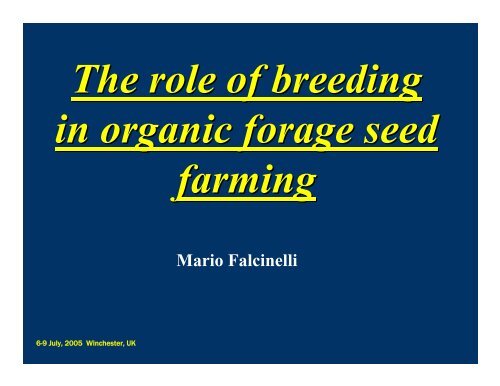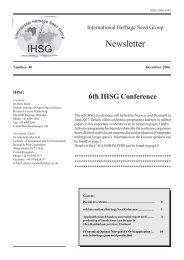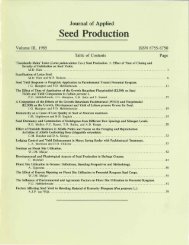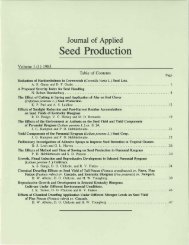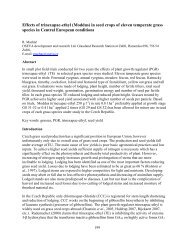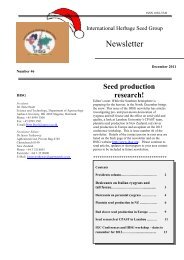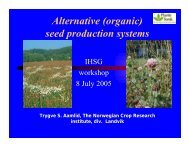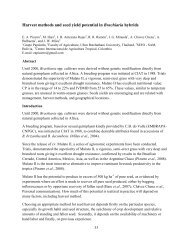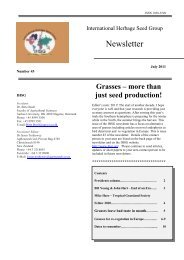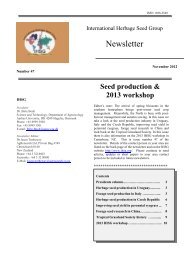Mario Falcinelli - International Herbage Seed Group
Mario Falcinelli - International Herbage Seed Group
Mario Falcinelli - International Herbage Seed Group
Create successful ePaper yourself
Turn your PDF publications into a flip-book with our unique Google optimized e-Paper software.
The role of breedingin organic forage seedfarming<strong>Mario</strong> <strong>Falcinelli</strong>6-9 July, 2005 Winchester, UK
In organic farming systems wecan use:- conventional varietiesIn this case we should pay lot ofattention to the choice of thevarieties
In alternative we can use:• Ecotypes• Landraces
B = Conventional varietiesA = Ecotypes or landraces<strong>Seed</strong> ProductionABLow inputHigh input
Moreover, we candevelop new varietiesspecific for organicagriculture
If so, the first step is todecideour “ideotype”
Grass and forage legumes
Once the ideotype has been decidedwe have to:select the breeding materials underorganic environmental
Other main traits of theideotype should be:• Satisfactory levels of production (both quantitativeand qualitative)• a deep root system,• being able to establishsymbiotic relationships with soilmicroorganisms (Rhizobium andMycorrhizae)
Moreover it should competewith weedsExploiting genetic variability for competitiveness:•Plant architecture•Rapid juvenile growth•Deep rooting• Allelopathic Exudate
• and being Resistant to diseasesand pestsAlfalfa caterpillarCuscuta spp.
We have already appliedsuch a strategyand
We developed a new variety ofalfalfa for the Italian organicfarming“Cuore verde” varietyDense stand evaluationExperimental fields inSpello (PG)Spaced plantsSelected plants<strong>Falcinelli</strong> and Torricelli, 2004. Proc of the First World Conference on Organic <strong>Seed</strong>s
ConclusionWhat is the role of breeding in organic farming?To help and guide farmers to chose the rightvarietyTo save ecotypes, local varieties and the geneticbiodiversity as a wholeTo start new breeding programs for obtainingvarieties specifically adapted to the OrganicProduction Methods (large genetic base)
So we have to perform researchand experimentationSince, generally private companies donot invest in breeding programs fororganic farmingthe Italian region confederationdecided to grant a project that is juststarting
The project name is“Azioni di innovazioni e ricerca a supportodel piano sementiero”(a concerted action to support seed production)And we are the project leader
TorinoUdineLodiBolognaFirenzePerugiaForli-CesenaAnconaLycopersicon esculentum L.Daucus carota L.Allium cepa L.Phaseolus vulgaris L.Brassica oleracea L.Solanum tuberosum L.Lactuca sativa L.Oryza sativa L.Triticum durum L.Triticum aestivum L.Trticum monococcum L.Triticum dicoccum SchublerZea mays L.Edysarum coronarium L.Trifolium spp.Medicago polymorpha L.Medicago sativa L.VegetablesCerealsForagesSassariPalermo
• Thanks to the <strong>International</strong><strong>Herbage</strong> <strong>Seed</strong> <strong>Group</strong> ForSupporting andrecommending This Project
Point for discussion• Use of conventional varieties• Alternative to conventional varieties• Breeding strategies• Breeding for seed production
3.7.Sept. 2006• 26 Eucarpia Fodder Crops and AmenityGrasses section• Breeding and seed production forconventional and organic agriculture• WWW.eucarpia2006.net


